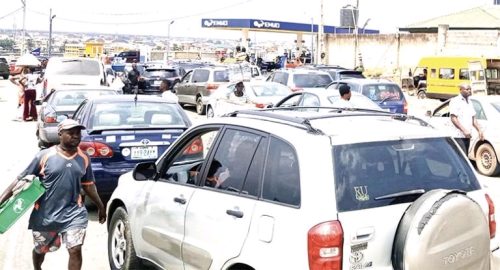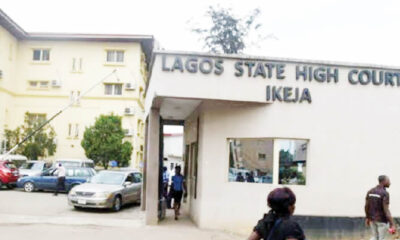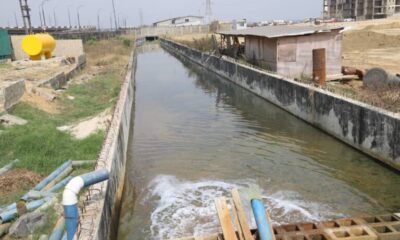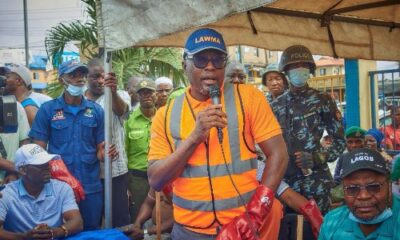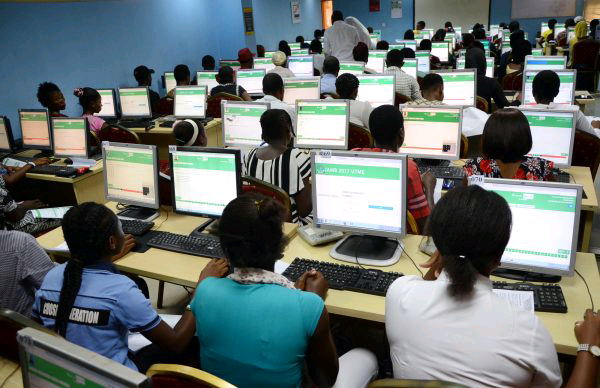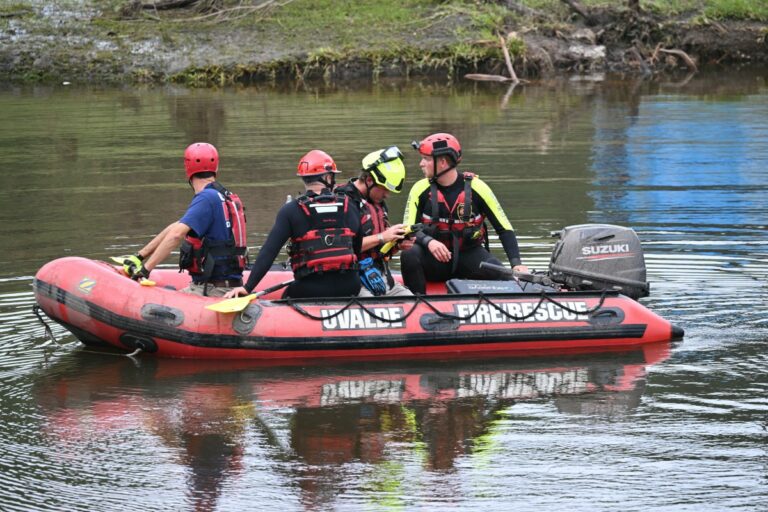Fuel scarcity worsened in Lagos, the Federal Capital Territory and other parts of the country on Tuesday, resulting in motorists spending hours at filling stations.
For oil marketers, the solution to the worsening fuel queues across the country is for the Federal Government to approve an increase in the pump price of the commodity.
Although some marketers had already raised the price of fuel in their outlets, they admitted that the move had not been approved by the government, noting that dealers could be sanctioned for selling above the regulated rate.
The approved pump price of Premium Motor Spirit, popularly called petrol, is N165/litre, but marketers are currently kicking against this rate, saying that it is no longer sustainable going by the global crisis in the energy sector.
A retail outlet located in the Kubwa Village Market, Abuja, dispensed petrol at N195/litre to motorists and still had queues.
Heavy fuel queues were seen in the few filling stations that sold petrol at the approved rate on Tuesday. Some of them included: the NNPC close to Gwarimpa on the Zuba-Kubwa expressway, Total filling station opposite the headquarters of NNPC, Nipco filling station on Zuba expressway, among others.
“The solution to this crisis is to increase petrol price and have it approved because the cost of diesel used in transporting these products to retail stations has risen from about N250/litre a few months ago to around N850/litre currently,” the Deputy National President, Independent Petroleum Marketers Association of Nigeria, Zarma Mustapha, told one of our correspondents.
The IPMAN official explained that the widespread queues in Nigeria were related to the global energy crisis that had dragged on for about four months since the Ukraine/Russia war started.
“Because of that crisis, the prices of crude have increased astronomically and Russia, being the largest producer of diesel globally, is inaccessible. So, people are not having access to purchase diesel, knowing full well that our refineries are not working,” Mustapha stated.
He added, “We solely depend on imported diesel, so based on that, the scarcity of diesel has become worse, which is the major product we use in transporting fuel to filling stations.
“The marketers have engaged the government in trying to see how best we can cushion the effects of the rise in diesel price. But, unfortunately, the price has continued to rise and based on that the government made an upward review of the bridging claims.”
He noted that despite the little upward reviews of the bridging rates in May and June this year, the adjustments were still not enough to cover the cost of transporting products.
Mustapha, however, stated that marketers were engaging the Federal Government, adding that it had been confirmed that the Nigerian National Petroleum Company Limited had enough stock.
The spokesperson for NNPC, Garba-Deen Mohammed, told our correspondent that the national oil firm was working out something with respect to the development and promised to revert. He, however, had yet to revert up till the time this story was filed.
Motorists lament 100% fare hike
This came as passengers in Lagos expressed concern over the hike in transport fares as a result of fuel scarcity in the state.
It was gathered that transport fares had increased by 100 percent in most parts of Lagos.
Moradekemi Kolawole, a commercial bus passenger, said, “This is too much. You can’t believe that instead of the usual N200 from Ogba to Ikeja, I paid N400. Now I’m going to Berger and the drivers are saying it is N300 instead of N150.”
Another passenger, who only identified himself as Dele, said, “I came in from Magboro to Secretariat today and I am now going back. I have already spent N800. And before now, it was just N400.”
A commercial bus driver, Dimeji Olaiya, explained that the scarcity of fuel had led to the increase in transport fares and stated that the situation might be worse in the next few days.
“This is not the first time we are experiencing this. Yesterday, I got to the filling station around 6 pm and left around 10:30 pm and I couldn’t still get petrol at the normal price. So, how do you expect me to carry passengers at the normal price? It is not going to work,” he said.
Marketers insist on price increase, fuel stations adjust pumps, hoard products
It was also observed that some filling stations began to hoard products as those that dispensed petrol had to increase the price of the commodity in Lagos.
Also, the Nigeria Customs Service of FOU Zone A, Ikeja, dispensed auctioned petroleum products at higher prices.
It was gathered that petrol was sold to buyers at the operational warehouse of the unit on Monday.
One of our correspondents, who visited the location on Tuesday morning and posed as a buyer, was told that the product was no longer available.
A female trader close to the warehouse, who bought the product and resold it on the black market, told The PUNCH that “the fuel won’t be available again until next Monday. Everything has been sold yesterday. They sell to people only on Mondays.”
When our reporter insisted on waiting to see if the products would be dispensed, the female trader said he should not waste his time, as she would not sell until the following Monday.
Another lady, simply identified as Joy, said, “If you had come yesterday, you would have got fuel. People were many yesterday, as they sold from around 8 am to 10 am. If you want to come around next Monday, you have to arrive early to register your name. The officers sell to people who register their names. And once you do that, you will have to wait for a while before they start to call names.”
It was learned that the business had been on for a long time and not as a result of the fuel scarcity. Like other contrabands, seized petroleum products are brought to the warehouse and sold at auctioned prices.
Joy said that a keg of 25 litres was usually sold at N3,000, but the price was hiked to N4,000 when it was sold on Monday.
Commuters stranded
Commuters were left stranded in various parts of Lagos due to the fuel scarcity and commercial bus drivers used the opportunity to increase transport fares.
At Jakande Estate, passengers were made to pay N300 to Oshodi, compared to the normal fare of between N150 and N200. From Oshodi to Obalende, passengers paid N500, compared to the usual fare of between N300 to N400 when there was no fuel scarcity.
At Obalende, many commuters who were either heading for Falomo, Lekki, Victoria Island or the Ajah axis of the state were seen stranded at various bus stops.
Some of the commuters who eventually got vehicles to their destinations had to pay between N500 to N700 to Lekki and Ajah, compared to the usual price of N200 for Lekki passengers and N400 for Ajah passengers.
A commuter, who simply identified himself as Seun, noted that even before the fuel scarcity, commercial buses had been collecting N500 to Yaba from Obalende, compared to the normal price of N200 in the evenings.
Seun said, “I pray I am able to get to Obalende by 4 pm today because I don’t know how much they will charge, with the way they are carrying passengers to Lekki, for N500.”
Black market booms
Black market players took advantage of the fuel scarcity, selling as high as N300/litre in Lagos, Abuja, Nasarawa and other states.
“There is no fuel at all. So, we have to buy from black marketers for N300/litre,” one of the conductors plying Cele to Berger, Mowe, and Ibafo in Lagos told one of our correspondents on Tuesday.
Petrol is yet to be deregulated and the current official price puts the product at between N162 and N165/litre.
Independent marketers, who started implementing a new price unapproved regime of between N170 to N190/litre at the weekend, insisted on Monday that it would be difficult for them to sell at the official pump price.
National Operations Controller, South-West, IPMAN, Mike Osatuyi, in a telephone interview said that the scarcity was no fault of oil marketers, adding that they could no longer sell at N165/litre.
“It is what they give us that we will sell. And we’ve had a short supply for some days now. It is a monopolistic market because NNPC is the only supplier. Currently, our members buy at N164 – N165/litre. How much are we expected to sell after adding transportation costs?” he asked.
“Moreover, the high price of diesel, which currently stands at N820/litre, has compelled us to spend as much as N500,000 and N800,000 to take a tanker of the product from Lagos and Ibadan,” he added.
The association had also, in a press statement on Monday, said its members could no longer sell below N180/litre.
The IPMAN, in a statement by its Lagos State Depot Secretary, Akeem Balogun, said, “With the current price, there is no way we can sell less than N180/litre. Members are hereby advised to sell at a sustainable price within their environment. Just make sure that the price is on your pump.
“Kindly contact the secretariat should you have any authority challenging your operations.”
A source had on Monday attributed it to NNPC’s reduction of product supply.
“We had a meeting with PPMC two weeks ago where we were told that the volume of products we were loading was too high. So, NNPC has reduced the volume it gives to us,” the source said.
Nigeria consumes an estimated 60 million litres of fuel daily. However, findings showed that by PPMC’s record, marketers loaded as much as 106 million litres per day as of April.
“So, PPMC kept lamenting and asking us where the extra products go. Of course, we all know that they go to neighbouring countries where they are being sold at higher prices. Apart from the fact that diesel price for transporting products is on the high side, fuel is a product highly subsidised by Nigeria, and Nigerians are not allowed to enjoy the benefits,” the source said.
Diesel is a deregulated product, and checks as of Monday showed that the product was currently sold at between N780-N820/litre.
A former chairman, Major Oil Marketers Association of Nigeria (MOMAN) and Chairman/CEO, 11 Plc, Tunji Oyebanji, said that the scarcity was temporary.
“As of last week, there were some talks about low stock and suppliers not giving products, but, I think it’s a temporary glitch because NNPC told us they had sufficient stock of fuel,” he said.
The Executive Secretary, MOMAN, Clement Isong, declined to comment.
An oil and gas engineer and principal consultant for Lonadek Services, Dr Ibilola Amao, said there was a need for fuel tankers to be tagged with Global Positioning System devices in order to track the movement of products.
“It is not rocket science to acquire data and statistics from measurement systems and pumps.”
The Federal Government definitely knows where the leakages are. If every tanker is tagged with GPS-sensitive devices, the culprits who are costing Nigeria a lot in foreign exchange losses can easily be identified,” she said.
Marketers differ on N1bn payment to NNPC
The Kano State branch of IPMAN has refuted claims that over N1bn was paid for petrol by its members and the product has not been delivered since October 2021.
Recall that the Chairman, IPMAN, Lagos Satellite Depot, Ejigbo, Mr Akin Akinrinade, had made the claim while speaking to journalists in Lagos on Monday.
However, in a statement in Kano on Tuesday, IPMAN, Kano Branch Chairman, Bashir Danmalam, said the claims about the N1bn paid to Pipelines and Product Marketing Company were baseless as there was no iota of truth in it.
He, therefore, challenged all those making such claims to produce relevant receipts for the payment of such money to enable the union to take up the matter.
He recalled that in about February 2021 following the outbreak of COVID-19, the NNPC introduced customer express whereby payments for the purchase of products were done online, adding that the NNPC then set up a committee which ensured that all those with tickets who paid manually were given the product.
He said, “I was a member of that committee that supervised the supply of the product to those marketers who paid manually before the introduction of customer express.
“So, we should stop politicising the issue of the petroleum business. To my knowledge, the only products not delivered by the NNPC are on the recent payments made.
“NNPC has since stopped collecting money from marketers except through the customer express when it’s sure of having the products in any depot across the country.”
He, therefore, called on the Federal Government to prevail on the management of the Nigerian Midstream and Downstream Petroleum Regulatory Authority to ensure that all private depot owners sell the products at the approved government price.
According to him, the failure by the management of NMDPRA to check the excesses of private depot owners was responsible for the flagrant and indiscriminate increase of the ex-depot price.
He said the Federal Government should be commended for the recent upward review of petroleum products transporters’ freight rate as the gesture was aimed at checking the challenges associated with the transportation of petroleum products across the country.
Danmalam said unless and until the NMDPRA ensured private depot owners sold the product at the approved government price, they would continue to dispense the commodity at higher prices.
Credit: The Punch

 BIG STORY4 days ago
BIG STORY4 days ago
 BIG STORY5 days ago
BIG STORY5 days ago
 BIG STORY13 hours ago
BIG STORY13 hours ago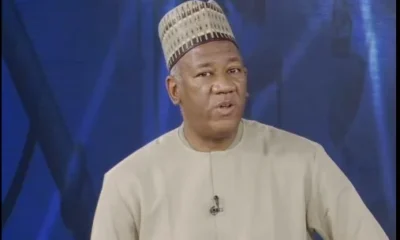
 BIG STORY5 days ago
BIG STORY5 days ago
 BIG STORY4 days ago
BIG STORY4 days ago
 BIG STORY1 day ago
BIG STORY1 day ago
 BIG STORY4 days ago
BIG STORY4 days ago
 BIG STORY2 days ago
BIG STORY2 days ago




